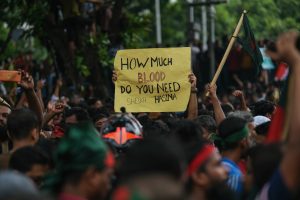A mass uprising may have relegated Sheikh Hasina and her government to history, but it will take years for Bangladesh to undo the harm done.
Over one and a half decades of increasingly autocratic rule, the Awami League – and the family at its helm – plundered state resources, forcibly disappeared activists and political opponents, and took a sledgehammer to institutional independence. How the interim government redresses this abuse – and the complicity that scaffolded it – will shape the country’s future trajectory.
The anger rippling through Bangladesh is warranted. When the Awami League assumed power in 2008, Bangladesh owed $33 billion in debt. By 2024, that number had jumped to $156 billion. For perspective, the national budget for Bangladesh for 2024 is $68 billion.
A large portion of this debt was accrued to fund mega-development projects that were plagued by endemic corruption. The Padma Bridge, for example, was originally funded by the World Bank for $1.2 billion before funding was withdrawn due to a “high-level corruption conspiracy.” When the bridge was finally completed in 2022, Prime Minister Hasina’s inauguration speech was defiant. “The Padma Bridge has been completed. Bangladesh’s economy has not collapsed. The country is moving forward at a breakneck pace,” she said.
No explanation was offered as to why the cost of the bridge had more than doubled to $3.86 billion, or how Bangladeshis should reconcile “breakneck” development with an inflation rate of 7.7 percent.
The Awami League’s parade of smoke and mirrors was reinforced by a draconian repression of free expression. In particular, the Digital Security Act (DSA) gave the government a carte blanche to initiate investigations into anyone whose activities were (subjectively) considered a threat. For example, after the country’s largest daily, Prothom Alo, published a report in May 2023 on the rising cost of living, the author was arrested for “tarnishing the image of the nation,” and the editor was sued. Days later, Hasina stood in Parliament and labeled the newspaper “an enemy of the Awami League, democracy, and the people of Bangladesh.” In the first three months of 2023 alone, 56 journalists were targeted by the government under the DSA.
Censorship went hand in hand with more brazen forms of control. According to Odhikar, a Bangladeshi rights organization, at least 708 people were forcibly disappeared by the Hasina government between 2009 and June 2024. Since the fall of the government, some of them have been released from “black site” prisons operated by the Ministry of Defense; many others are still missing and presumed to have been killed.
All this happened before August 5, before the murder of hundreds of civilians, before news broke of billions embezzled by the former prime minister and her family. And so, now, for the first time in a long time, Bangladeshis are looking to exercise their right to justice.
However, if Bangladesh is to avoid the pitfalls of its past, the interim government must ensure judicial processes are not politicized. Unfortunately, events over the past few weeks point in the opposite direction.
Ministers under the Awami League government have been arrested en masse, and party officials attempting to leave the country have been stopped by the military at airports, land borders, and sea crossings. At least two journalists working for a pro-Awami League media outlet have also been taken into custody. As of now, the specific charges for these arrests, if any, remain unclear.
Mass allegations, however, are rife. 156 individuals, including ministers and party leaders of the Awami League, have been charged with ordering the murder of a protester, Rubel, and an additional 400 unnamed individuals have been charged as well. Over the past few weeks, arrests of former government officials have followed a recurring pattern: officials are “caught” by the military while trying to leave the country, handed over to the police, and cases lodged for complicity in the murder of civilians during the uprising. As others have highlighted, in reality, these arrests are based on murder cases with which the detainees have no direct connection.
Unfortunately, the courts tasked with adjudicating these cases transparently, and with adherence to due process, are also in disarray. During its tenure, the Awami League politicized all judicial branches, installing partisan judges at every level of the legal system. While the chief justice and five other Supreme Court judges may have resigned amid protests, short-term reshuffling will be band-aid solutions to the deep rot within the system. In Bangladesh today, while justice delayed can be seen as justice denied, justice hurried may lead to justice buried.
The challenge that faces the interim government of Bangladesh is time. On one hand, the government is expected to deliver swift judicial remedy for the Awami League’s many crimes; on the other, to do so transparently will require time-intensive reform at the level of the institution. In a country in flux, what is ultimately at stake is not simply mass accusations or summary arrests, but trust between Bangladeshis and Bangladeshi institutions.
Steps that build confidence will be key. For example, requesting a United Nations-led independent judicial commission to investigate killings during the protests is both pragmatic and ensures a level of legitimacy beyond what the court system in Bangladesh can currently offer. Importantly, this also buys time for the interim government to assess, consult, and outline a blueprint for reform that shields the judiciary from the political branches of the state.
Additionally, the Office of Human Rights is uniquely equipped to guide transitional justice mechanisms including, but not limited to, constitutional and legal reform, the strengthening of civil society, and reform of history education. With everything that has happened, and in preparation for everything that might transpire, these are challenges Bangladesh will need to face head-on, but to do so, it will need the support of its friends.

































